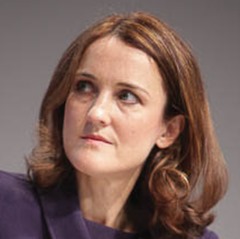Governments set out shared future principles
 The rule of law is the foundation for a shared future and commemorations should be sensitive to all parts of society. agendaNi sums up the main messages from Theresa Villiers and Eamon Gilmore at the British-Irish Association.
The rule of law is the foundation for a shared future and commemorations should be sensitive to all parts of society. agendaNi sums up the main messages from Theresa Villiers and Eamon Gilmore at the British-Irish Association.
The UK and Irish governments have set out their general approaches to parading, flags and the legacy of the Troubles – the three contentious issues to be considered by the Haass talks this autumn. Northern Ireland Secretary Theresa Villiers and Irish Foreign Minister Eamon Gilmore addressed the British-Irish Association at its annual conference in Cambridge in early September.
The association was founded in 1972 by a group of historians and political thinkers, including the economist TK Whitaker and the late Robert Kee and Garret Fitzgerald. Its annual conference is one of the key events on the calendar of British-Irish events.
Villiers, who was born in March 1968, acknowledged that for the first 30 years of her life she “mainly associated Northern Ireland with instability, sectarian strife and terrorist bombs.” Over the last 15 years, the Good Friday, St Andrews and Hillsborough agreements had “changed life in Northern Ireland for the better in a fundamental way.”
It was clear from Villiers’ comments that the rule of law was also fundamental to a shared future. Street violence was “not a cost-free option” and damaged Northern Ireland’s reputation, placed an “intolerable burden” on the police and ruined the prospects of those who were rioting.
“We stand four-square for the rule of law,” she stated, “whether it is under attack from so-called loyalists or dissident republicans.” It was, though, important to consider the issues that could contribute to disorder.
 “It’s impossible not to be moved by harrowing stories from families who lost loved ones, often in the most brutal of circumstances,” she remarked. While there was no over-arching process for the past, several separate initiatives were already in place.
“It’s impossible not to be moved by harrowing stories from families who lost loved ones, often in the most brutal of circumstances,” she remarked. While there was no over-arching process for the past, several separate initiatives were already in place.
The Troubles were extensively documented in a wide range of media, academic and government archives, including the Cain project and the state papers held by the Public Records Office.
Investigations into the past were conducted by the Police Ombudsman and Historical Enquiries Team, and the Commission for Victims and Survivors supported bereaved relatives. The Government had accepted its responsibility in the Bloody Sunday, Claudy and Pat Finucane cases.
Releases from the archives had to be weighed against the right to life of all parties – protected by Article 2 of the European Convention on Human Rights. In addition, any mechanisms for dealing with the past needed to take the following factors into account:
• full consistency with maintaining the integrity of the rule of law;
• the UK Government’s fiscal position; and
• no equivalence between those enforcing the law and those breaking the law.
“For us, politically motivated violence from whatever side was never justified,” she added, “and we will not be party to attempts to re-write history by legitimising terrorism.”
Intertwined
Eamon Gilmore gave a frank assessment of his recent meetings with business and community leaders in Belfast. In many cases, they felt that DUP and Sinn Féin did not represent their interests and that the loudest – and most extreme voices – were dominating the political debate.
The past was having a “corrosive effect” on politics and community relations, and sectarianism was “pervasive and undiminished … and not solely in the more deprived communities.” Restoring the Civic Forum and enacting a bill of rights would, in Gilmore’s view, would strengthen civic society.
The disputes over the Belfast City Hall flag, the Ardoyne parade and the Castlederg commemoration meant that the two governments had to “re-assert” their roles as co-guarantors of the Good Friday Agreement.
The Haass talks were a “unique opportunity” and they needed to produce a “clear way forward” on each contentious issue. He paid tribute to An Garda Síochána and the Irish
Army’s counter-terrorism work but acknowledged that the Irish state could have done more to prevent IRA violence.
Commemorations should be prepared and carried out in a way that “gives no offence and is mindful of the sensitivities of all citizens.” He pointed to the example shown by the Queen and former President Mary McAleese.
Gilmore, though, has rarely spoken on North/South relations since taking office. Irish News commentator Brian Feeney has pointed out that the Irish Government had no input into the Downing Street Economic Pact.
His last speech on northern affairs was at the SDLP conference in November 2012. Labour’s 2011 general election manifesto promised the “earliest possible completion” of a study on greater co-operation. However, two and a half years later, this study has not yet started and an initial efficiency review is still unpublished.
Eamon Gilmore also viewed the European Union as a “shared asset” for Anglo-Irish relations. He warned that a British withdrawal would “slow and limit our efforts towards closer co-operation with each other … at worst it could reverse them.”
While Ireland clearly supported British EU membership, it had no view on Scottish independence. Regardless of the referendum’s outcome, the Irish Government wanted to maintain the “close relationship with the peoples of our islands, regardless of the constitutional configuration.”
National responsibilities
While most aspects of community relations policy are devolved, the two governments are still responsible for overseeing the political process and the following more specific areas:
• parading (a reserved matter under the Northern Ireland Act 1998);
• the flying of flags on Civil Service buildings (regulated by the Secretary of State);
• regulation of archives (including Public Records Office files in Belfast);
• Troubles-related public inquiries; and
• the Independent Commission for the Location of Victims’ Remains.
The US Government also provides support through the International Fund for Ireland, exchange programmes and promoting women in politics and integrated education.
Security statements
The Secretary of State outlines the Government’s assessment of the security situation in a written ministerial statement, produced every six months. This replaces the work of the Independent Monitoring Commission, which operated between 2004 and 2011.
The latest statement, made on 25 July, outlines co-operation between the PSNI and gardaí, including the prevention of terrorist attacks. The activities of republican and loyalist paramilitary groups are also summarised and contrasted with the successes of the G8, City of Culture and World Police and Fire Games. The assessments are available online at gov.uk/nio





